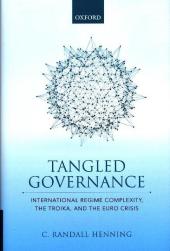 Neuerscheinungen 2017Stand: 2020-02-01 |
Schnellsuche
ISBN/Stichwort/Autor
|
Herderstraße 10
10625 Berlin
Tel.: 030 315 714 16
Fax 030 315 714 14
info@buchspektrum.de |

C. Randall Henning
Tangled Governance
International Regime Complexity, the Troika, and the Euro Crisis
2017. 320 p. 240 mm
Verlag/Jahr: OXFORD UNIVERSITY PRESS; OUP OXFORD 2017
ISBN: 0-19-880180-7 (0198801807)
Neue ISBN: 978-0-19-880180-1 (9780198801801)
Preis und Lieferzeit: Bitte klicken
Tangled Governance addresses the institutions that were deployed to fight the euro crisis, reestablish financial stability and prevent contagion beyond Europe.
Tangled Governance addresses the institutions that were deployed to fight the euro crisis, reestablish financial stability in Europe, and prevent contagion to the rest of the world. Henning explains why European leaders chose to include the International Monetary Fund (IMF) in the crisis response and provides a detailed account of the decisions of the institutions that make up the troika (the European Commission, European Central Bank, and IMF). He examines
the institutions negotiating strategies, the outcomes of their interaction, and the effectiveness of their cooperation. The institutional strategies of key member states, including Germany and the United States, are also explored in this study.
The book locates its analysis within the framework of regime complexity, involving clusters of overlapping and intersecting regional and multilateral institutions. It tests conjectures in the regime-complexity literature against the seven cases of financial rescues of euro area countries that were stricken by crises between 2010 and 2015. Tangled Governance concludes that states use some institutions to control others, that complexity is the consequence of a strategy to control agency drift.
States mediate conflicts among institutions and thereby limit fragmentation of the regime complex and underpin substantive efficacy. In reaching these conclusions, the book also answers several key puzzles, including why Germany and other northern European countries supported IMF inclusion despite
its adopting positions opposed to their preferences; why crisis fighting arrangements endured intense conflicts among the institutions; and, finally, why the United States and the IMF promoted further steps to complete the monetary union.
Given Tangled Governance´s impressive empirical richness and its very convincing theoretical argument, the book is highly recommendable as a comprehensive account of the complex governance issues of the crisis period and the equally numerous as well as heterogeneous actors and institutions involved. The very well prepared data on the conditions of the country programmes together with its hint towards the important role of the United States of America and the IMF in the European governance regime offers valuable insights for both scholars searching for an inclusive account of the complex politics and governance mechanisms of the period in question, and those scholars interested in EU studies that want to learn more about the complex regime of European multilevel governance from a more international and global governance perspective. Sebastian Heiderbrecht, JMCS
C. Randall Henning is Professor of International Economic Relations in the School of International Service at American University in Washington, D.C. He specializes in International Political Economy, Global Governance, and regional integration, especially with respect to Europe and East Asia. Europe´s monetary union and the interaction among regional and multilateral institutions are topics of special focus. The author of numerous books and journal articles, he
has written most recently on emerging-market perspectives on the Group of Twenty (G20) and international financial institutions, regional financial facilities, and the lessons for Europe from fiscal federalism in the United States.


